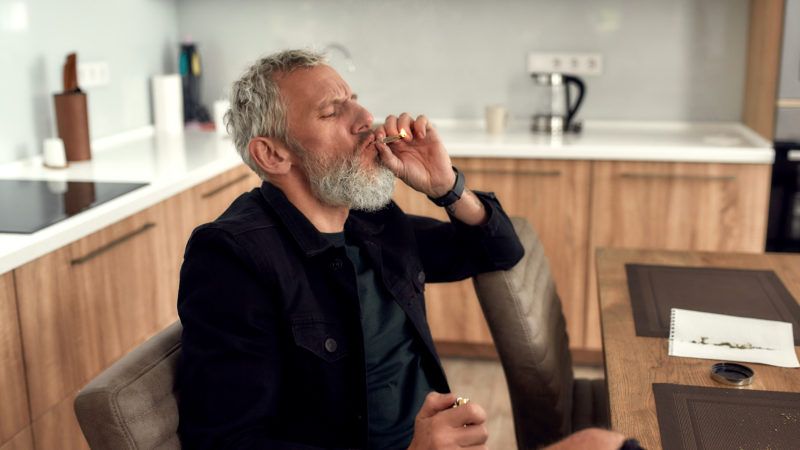San Francisco Considers $1,000 Fines for People Smoking Tobacco or Cannabis in Their Apartments
A bill under consideration by the city's Board of Supervisors would ban smoking in private dwellings located in apartment buildings with three or more units.

San Francisco politicians are considering yet another policy that would harm renters while infringing on property rights: a ban on smoking inside private apartment buildings.
On Thursday, a committee of the city's Board of Supervisors voted to advance a bill that would ban smoking inside private dwellings located in apartments with three or more units. The San Francisco Examiner reports that the restrictions would apply not just to tobacco products, but also to smoking marijuana and even to vaping.
The goal, according to bill sponsor Supervisor Norman Yee, is to protect nonsmoking apartment dwellers from the fumes of their inconsiderate neighbors.
"I'm proud to help residents avoid being exposed to secondhand smoke in their own homes," Yee tweeted when he introduced the bill last week. "Smoke easily moves between units and buildings. Now that more of us work from home, it's more important than ever because there is no way to contain it."
San Francisco currently bans smoking in the enclosed common areas of multi-unit buildings. Yee's proposal extends this to the interiors of those buildings' private homes, as well as to balconies and patios.
The bill would allow the city's Department of Public Health to fine offenders up to $1,000, although the Examiner reports that they would first receive warnings. Violating this ban would not be grounds for eviction, according to the bill's text.
During the first year of the ban, the Department of Public Health would also be required to run a "multilingual and culturally responsive public information campaign to raise awareness of the smoking prohibition and cessation resources."
Sixty-three California cities have implemented similar bans. Yee's proposal is endorsed by the American Cancer Society Cancer Action Network, the American Heart Association, and the San Francisco Tobacco-Free Coalition, all of which have issued letters in support.
These letters list common claims about the dangers of secondhand smoke, including the idea that that there's "no safe amount of secondhand smoke exposure" and that secondhand smoke kills 41,000 people a year. Yet more recent medical studies have found no clear link between secondhand smoke and lung cancer. Improbable claims that smoking bans in public spaces bring massive, immediate drops in heart attacks and heart disease have also been largely debunked. A 2016 report from the Royal College of Physicians in the U.K. found "there is, so far, no direct evidence that such passive exposure [to e-cigarette vapor] is likely to cause significant harm."
Yee has argued for his ban on the grounds that people are largely expected to shelter in their homes during the pandemic. One could use that same argument against the proposed ban: It's better to have people smoking in their apartments than lighting up on crowded public streets.
This is particularly true for marijuana smokers, who would have few places to indulge if Yee's ban were to pass. In San Francisco, smoking marijuana is illegal in public and in almost all businesses besides the city's cannabis lounges—which are closed during the pandemic.
To his credit, I guess, Yee has proposed an amendment allowing people with medical marijuana cards to continue smoking weed in their apartments, according to the Examiner. At least one supervisor, Rafael Mandelman, has said he wants a blanket exemption for cannabis.
Given the tenuous public health case for cracking down on secondhand smoke, it's hard to see this proposal as anything other than an advanced form of invasive nanny statism. It effectively treats people's homes as public places just because they happen to live in an apartment building.
That's pretty bad for privacy and pretty bad for liberty. It's also pretty discriminatory against apartment residents. Folks wealthy enough to afford a home, or at least a duplex, in the ultra-expensive city won't be affected by the ban.
None of this is meant to discount the preferences of nonsmokers who don't want to smell cigarette smoke in their own homes. But that preference can be satisfied by living in a building that bans smoking as a condition of the lease. Similarly, smokers who want to toke up in their own homes should be able to select a building that permits that.
Obviously, people's ability to find a building that caters to their indoor smoking preferences is made much more difficult by San Francisco's ban on apartments in much of the city. That shortage of housing is forcing these two groups of people to live cheek-by-ashtray in whatever homes they can find, leading to conflict.
Surely a better solution would be to legalize new construction so that consumers can choose from more types of housing in more places. Smokers and nonsmokers alike would then be more able to pick environments that better suits their needs.
The full Board of Supervisors will consider Yee's smoking ban next month.
Rent Free is a weekly newsletter from Christian Britschgi on urbanism and the fight for less regulation, more housing, more property rights, and more freedom in America's cities.


Show Comments (86)